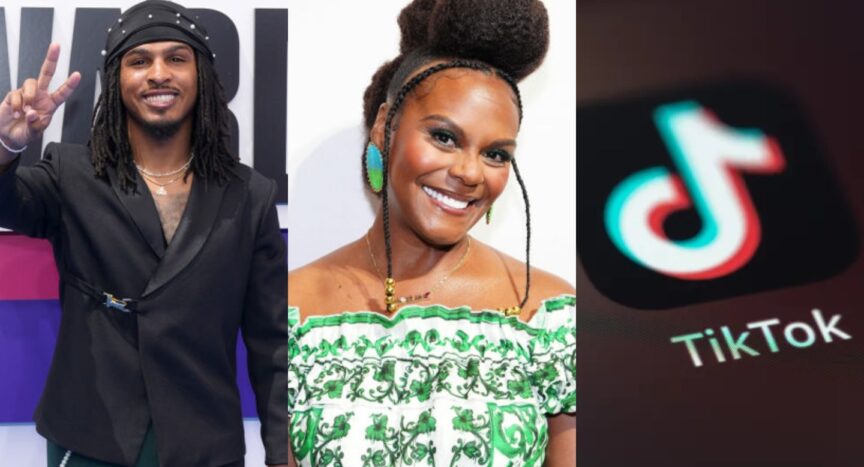As TikTok faces a potential U.S. ban, users are grieving the loss of their digital community and exploring new platforms like RedNote.
Since the pandemic, TikTok has grown into one of the most influential social media platforms in the United States. From lighthearted comedy to educational content, the app has opened doors for creators and users across the country, especially Black creators like Reese Teesa, Khaby Lame, Tabitha Brown and Keith Lee who all broke out on the platform. However, in April 2024, the U.S. Senate passed a bill pressuring TikTok’s Chinese parent company, ByteDance, to sell the platform or face a ban in the U.S.
With the case now before the Supreme Court, TikTok creators and users find themselves in limbo as they await a final decision on the app’s fate, set for January 19. In an attempt to protect this thriving digital community, Massachusetts Senator Ed Markey introduced the “Extend the TikTok Deadline Act” earlier this week. Yet, the possibility of losing TikTok has already prompted users to consider their next steps if the app disappears.
While one might expect TikTok’s user base to migrate to established platforms like Instagram, Snapchat, or Facebook, the choice isn’t that simple. TikTok’s unique algorithm has cultivated a sense of digital community that its competitors have struggled to replicate. For many, the platform feels like an oasis of creativity, relatability, and support. Sure, social media is never entirely free of trolls, but TikTok feels different—like a space where people are more open-minded and genuinely uplifting.
Beyond its community vibe, TikTok also functions as a versatile tool, doubling as a search engine. Users can find everything from restaurant recommendations to food recipes, with video content that provides a level of authenticity and visual detail that traditional text reviews often lack. This dynamic appeal has made TikTok a hub for creators across generations and industries, offering a space for humor, inspiration, education, promotion, and pure aesthetics.
TikTok vs. Instagram: Why the migration isn’t simple
Although Instagram Reels offers a similar short-form video experience, the user dynamics differ significantly. Many creators and users describe Instagram’s environment as harsher and less engaging. While TikTok comment sections are known for humor and connection, Instagram’s comments often feel critical and judgmental.
“[Instagram] reels comments be too serious for me it don’t even be funny,” one TikTok user observed.
Another echoed: “I genuinely hate [Instagram] for this exact reason. The audience is insanely different.”
But it’s not just about vibes. Many TikTok users are reluctant to pour their energy into Instagram, owned by Meta, because of what they see as hypocrisy. One of the main arguments against TikTok is concern over data privacy and its ties to China.
“Congress is not acting to punish ByteDance, TikTok, or any other individual company,” Senate Commerce Committee Chairwoman Maria Cantwell explained. “Congress is acting to prevent foreign adversaries from conducting espionage, surveillance, and maligned operations.”
Still, TikTok users can’t help but side-eye Meta, whose own history of data privacy scandals and blatant copying of competitors (remember when Instagram Stories magically appeared after Snapchat’s rise?) leaves them skeptical.
So, What’s RedNote?
RedNote, or Xiaohongshu, is a wildly popular Chinese social media app that feels like a mix of Pinterest and Instagram. Founded in 2013, the platform has built a reputation for its travel tips, beauty hacks, and lifestyle content. One of its standout features? A smart algorithm that prioritizes user interests over follower counts, making it feel a lot like TikTok.
With the clock ticking on TikTok’s potential ban, U.S. users have started flocking to RedNote—even though the app is entirely in Mandarin. Despite the language barrier, users are embracing its community-focused design and fresh approach to digital content.
TikTok’s future may still be uncertain, but one thing is clear: the platform has redefined what it means to build an online community. Whatever happens next, TikTok’s legacy will live on, setting a new standard for how we connect in the digital age.
!function(){var g=window;g.googletag=g.googletag||{},g.googletag.cmd=g.googletag.cmd||[],g.googletag.cmd.push(function(){g.googletag.pubads().setTargeting(“has-featured-video”,”true”)})}();
More must-reads:
- 17 trailblazing members of Alpha Kappa Alpha Sorority, Incorporated, in honor of their 117th’s founder’s day
- Keke Palmer opens up about the ‘toxic dynamic’ of her relationship and the media attention it garnered: ‘I hated it’
- How to Drastically Lower Your Risk of Dementia After Age 55: Key Strategies




